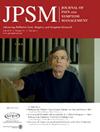A Live-Music Therapy Protocol for Pain Management in Advanced Cancer: The MSPD Pilot Study
IF 3.5
2区 医学
Q2 CLINICAL NEUROLOGY
引用次数: 0
Abstract
Background
Patients with advanced cancer often experience disease- and treatment-related pain. Previous studies have shown that music therapy can help manage pain. The aim of this pilot study was to evaluate the effects of a live-music therapy protocol, delivered by a trained music therapist, to induce relaxation in patients, allowing for real-time patient management and tailored sessions.
Methods
This prospective, exploratory study included patients with advanced cancer with a pain score ≥3/10 before the intervention (NCT05315427). A trained music therapist performed a single music intervention to induce a state of deep relaxation. We evaluated the effect of music therapy on pain using a numerical rating scale before and after intervention, taking into account analgesic intake before the session. Secondary objectives included symptoms assessment, patient satisfaction, and interest in future sessions.
Results
Forty patients were included. Pain significantly decreased from 4.9 (95% CI: 4.3–5.4) to 3.5 (95% CI: 2.9–4.2) (P < 0.0001) following music intervention, regardless of analgesic intake. We observed a significant reduction in fatigue (6.2 vs. 4.3) and anxiety (2.7 vs. 1.0) (P < 0.0001), and an improvement in well-being (5.2 vs. 3.3) (P < 0.0001). The mean satisfaction score was 8.9 (95% CI: 8.4- 9.3), and 95% of patients were willing to have a second session.
Conclusions
A single session of music-induced relaxation led to a short-term reduction of pain in patients with advanced cancer while improving their symptoms. Future research should confirm the efficacy of our intervention, assess its long-term effects, and explore the benefits of a multisession program.
晚期癌症疼痛管理的现场音乐治疗方案:MSPD试点研究。
背景:晚期癌症患者经常经历与疾病和治疗相关的疼痛。先前的研究表明,音乐疗法可以帮助缓解疼痛。这项初步研究的目的是评估由训练有素的音乐治疗师提供的现场音乐治疗方案的效果,以诱导患者放松,允许实时患者管理和定制疗程。方法:本前瞻性探索性研究纳入干预前疼痛评分≥3/10的晚期癌症患者(NCT05315427)。一位训练有素的音乐治疗师通过单一的音乐干预来诱导深度放松状态。我们在干预前后使用数值评定量表评估音乐治疗对疼痛的影响,并考虑到治疗前的止痛药摄入。次要目标包括症状评估、患者满意度和对未来治疗的兴趣。结果:共纳入40例患者。疼痛从4.9 (CI95%: 4.3 - 5.4)显著降低到3.5 (CI95%: 2.9 - 4.2)(结论:单次音乐诱导的放松可以在短期内减轻晚期癌症患者的疼痛,同时改善他们的症状。未来的研究应该确认我们的干预的有效性,评估其长期效果,并探索多期治疗方案的好处。
本文章由计算机程序翻译,如有差异,请以英文原文为准。
求助全文
约1分钟内获得全文
求助全文
来源期刊
CiteScore
8.90
自引率
6.40%
发文量
821
审稿时长
26 days
期刊介绍:
The Journal of Pain and Symptom Management is an internationally respected, peer-reviewed journal and serves an interdisciplinary audience of professionals by providing a forum for the publication of the latest clinical research and best practices related to the relief of illness burden among patients afflicted with serious or life-threatening illness.

 求助内容:
求助内容: 应助结果提醒方式:
应助结果提醒方式:


